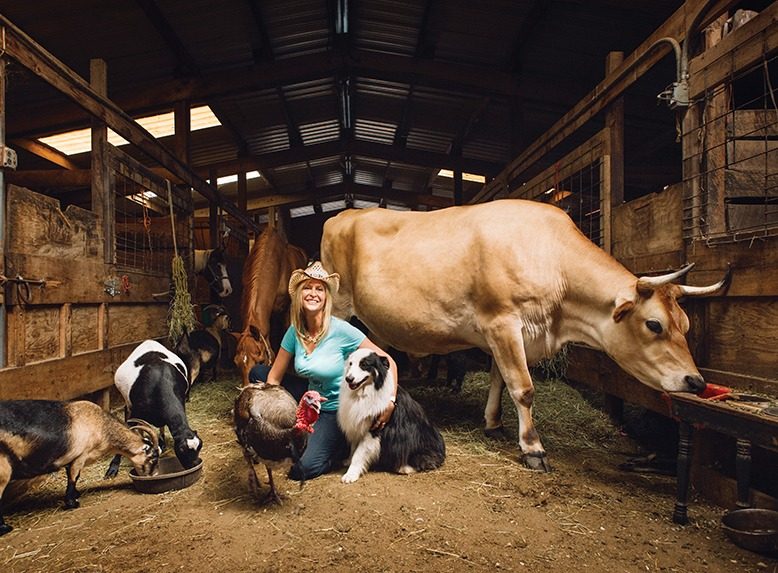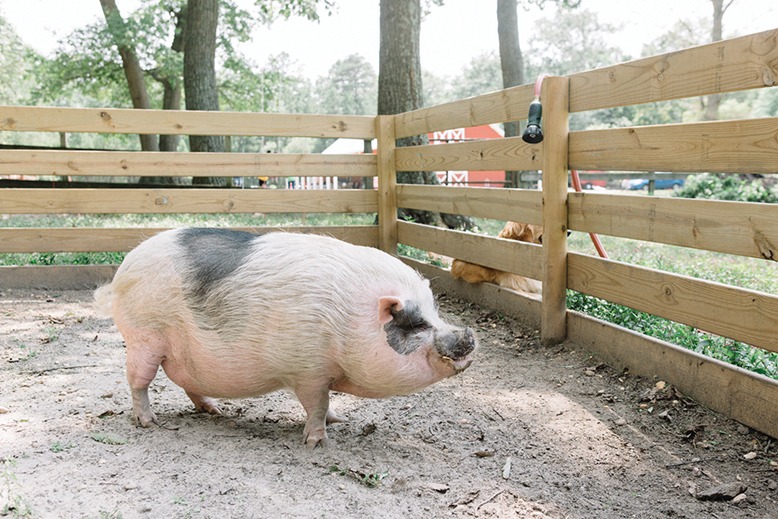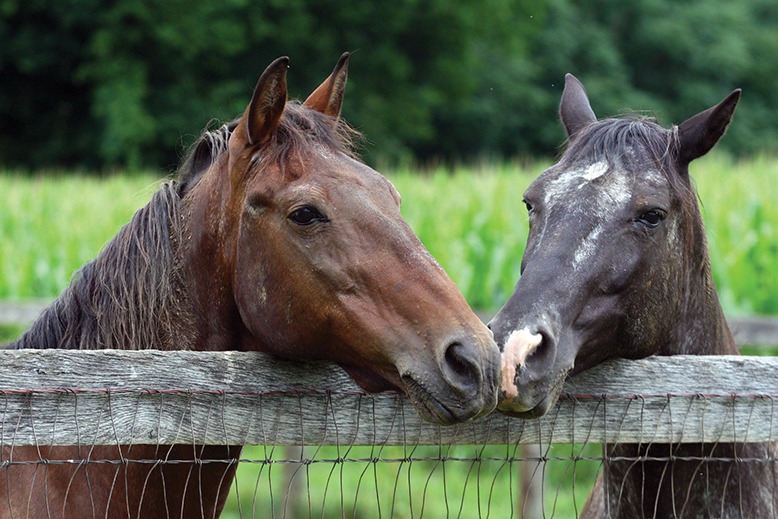
Poppy and Mini Pearl share a pen at Mylestone Equine Rescue in Phillipsburg. Poppy is a goat; Mini Pearl is a miniature horse. Though it may seem an odd friendship, the two also share a past of horror, but a present and future of sanctuary. They were rescued from a hoarder’s house in Warren County, where they had lived in a tiny bedroom for two years, never going outside. They ate sheet rock out of boredom. The animals were discovered when the hoarder was evicted. Susan Kelly and Bruce Thompson, who run Mylestone Equine Rescue, were contacted, and the animals were saved.
Such emergencies are not uncommon. This past year, Laurie Zaleski, of Funny Farm Rescue & Sanctuary in Mays Landing, received a phone call from New Jersey Aid for Animals alerting her to abandoned pigs at a nearby location. Left to freeze and without food, the father and two offspring survived by eating the mother and two other siblings who had starved to death. Zaleski brought the surviving pigs, whom she would later name Pappa, Beau and Luke to her sanctuary, where they now enjoy safe and happy lives.
In April 2015, Mike Stura, of Skylands Animal Sanctuary & Rescue in Wantage, got a different kind of call. This one was about mass animal abuse. When Stura arrived on the scene in Lafayette, he was shocked to find piles of dead animals.
“It was horrific,” says Stura. “The worst case of animal abuse I’ve ever seen.”
Stura was able to take nine of the surviving animals to his rescue and provide a safe home for the four sheep, three pigs, a goat, and a cow named Pammy, who has risen to be the head of one of the sanctuary’s herd of 22.
Such acts of kindness and countless volunteer hours are the lifeblood of animal sanctuaries. There are more than 20 such havens throughout the Garden State. We visited three, each a model of what can be done to help New Jersey’s unwanted, abandoned and abused animals.
[RELATED: Off the Fast Track: Rescuing Racehorses]

This tiny calf, Jimmy, became Mike Stura’s inspiration to open Skylands Sanctuary in July 2014. Courtesy of Skylands Animal Sanctuary & Rescue
Skylands Animal Sanctuary & Rescue
The love of an ill-fated calf prompted truck driver Mike Stura to create a sanctuary—but the story starts with a steak. A fellow driver had been talking about a two-day marinated steak his wife would be making for dinner.
“He was a big guy,” Stura recalls, “and it just struck me out of the blue: How many animals had been killed so he could maintain his size?”
The idea of killing animals for food got under his skin. Stura became a vegetarian.
“At that time, there weren’t a lot of us,” says Stura, “but the more I saw, the more I wanted to do something to save animals.”
One day, Stura was having a veggie burger at a roadside restaurant when he saw a flier for a nearby farm encouraging people to “meet our sheep.”
“That day,” he says, “I learned that calves are taken from their mothers and the female cows kept pregnant to produce milk. It changed my life.”
Stura gave up dairy and began his efforts to volunteer at sanctuaries. In time, he and his brother fenced a small piece of land in Ringwood to keep animals. Soon it was home to three rescued goats and a bull.
One day, Stura received a call from a Connecticut woman and her daughter about a calf named Jimmy, who had been taken from his mother on a dairy farm when it was less than 30 minutes old. “He was placed in a plant nursery’s dog run to attract people to buy pumpkins,” says Stura. “One day, the owner told the woman, ‘This will be your last time seeing him.’”
The farmer was taking Jimmy to slaughter, but told the woman she could have the calf if she wanted him. Having no place for him, they called Stura.
“When I got there, [Jimmy] was three weeks old and 105 pounds,” says Stura. “He was in a little plastic igloo, and I crawled in with him. Normally, an animal would not allow this. I felt his front knees, and they were hot and swollen and infected.”
Stura took Jimmy to Cornell Veterinary Hospital in New York and was told that he had septic arthritis from not receiving enough colostrum from his mother’s milk.
“They suggested putting him down,” says Stura. “They said I wouldn’t be able to afford his care and that I should say goodbye.”
Stura couldn’t do that. He gave the animal hospital his credit card and had Jimmy admitted. The hospital treated Jimmy with a concoction of antibiotics that killed the infection. Six weeks later, Stura took Jimmy home.
Unfortunately, the area where his rescued goats were living was too rocky for Jimmy. “I had to find a place for him,” says Stura. “He was my inspiration to buy the farm and create Skylands Sanctuary.”
The nonprofit Skylands Animal Sanctuary & Rescue was incorporated in July 2014; the first tour was given the following May.
Over the years, Stura has rescued numerous animals, including Brianna, a cow who famously escaped from a truck on Route 80 on the way to the slaughter house. After Stura rescued her, he discovered Brianna was pregnant. Two days later, she gave birth to Winter. Mother and daughter live happily at Skylands.
A pair of turkeys, Robin and Andy, arrived at Skylands in July 2015. Destined to be Thanksgiving dinners, the broad-breasted, white turkeys were mysteriously dropped off at the sanctuary.
“They like to show off and admire themselves in the mirror,” says Stura.
A call came in last winter that a calf had been born in Wisconsin unable to walk and, consequently, nurse. To save Trevor, Stura and two volunteers drove in a storm to Wisconsin and back to Cornell Veterinary Hospital. These days, Trevor enjoys roaming the fields at Skylands.
“We are a nonprofit and have volunteers along with three full-time and one part-time employee who help here,” says Stura. “I’ve given up the trucking business and am here or out rescuing animals as much as possible. Having a background with trucks and fixing them is a huge asset,” he says. “It saves a lot of money having to hire someone—and I can transport large animals.”
The 232-acre sanctuary is home to 250 animals, including sheep, cows, horses, goats, pigs and fowl.
Alas, Jimmy passed away last August after a hip dislocation. Stura, a burly, tattooed ex-truck driver, still gets teary-eyed talking about him.
“None of this would ever have happened,” he says, “if not for Jimmy.”

Papa the pig is one of more than 600 animals who have found a home at Funny Farm in Mays Landing. Courtesy of Funny Farm Rescue & Sanctuary
Funny Farm Rescue & Sanctuary
There are few boundaries at Funny Farm Rescue & Sanctuary. Since 2012, the 20-acre farm in Mays Landing has sheltered and cared for unwanted, sick, elderly, injured, disabled and abused animals—including alpacas, horses, birds, pigs and goats. The creatures roam blissfully around the grounds.
As with other sanctuaries, Funny Farm is often the last hope for these abused or abandoned animals. The nonprofit owes its beginnings to owner Laurie Zaleski’s mother. Growing up, Zaleski’s mom rented a home for 28 years and worked for animal-control services. Many an unwanted creature with no place to go lived at the home. In 2000, Zaleski purchased the farm for her mother, who died shortly after the sale, so Zaleski decided to run the farm herself. The result was Funny Farm.
“We give domestic, farm and exotic animals the chance to live out their lives in a happy, safe and protected home,” says Zaleski. “Another important part of our mission is to prevent cruelty to animals by increasing the awareness of abuse through education. To do this, we have schoolchildren to the farm, and we go out into schools and read the children’s books they’ve published about the animals that live on the farm.”
In some cases, Zaleski and her staff administer medication to the more than 600 resident animals.
Like a modern-day Dr. Dolittle, Zaleski wanders around the farm talking to the animals, displaying her deep sense of admiration for each. “Every animal here,” she says, “has a name and a personality.”
Funny Farm has relationships with several local and statewide organizations that request its services for animal shelter and care. Many of the animals here arrive in unusual ways, like the box of cats that was dropped off last summer.
“Sometimes it’s like an animal hit-and-run,” says Zaleski. “Animals just arrive. At times we can track down who left them, but not usually.”
Among Funny Farm’s current menagerie are a white peacock and three colored ones: Ricky and Lucy, their child, and recently, their grandchild. The pair lived in a nearby condominium complex. Their human neighbors were not fond of their defecating on porches and cars and munching on flowers.
“Some people were even threatening to shoot them if someone didn’t take them,” says Zaleski.
After three months of failed attempts, Zaleski finally corralled the peacock couple, and brought them to their new home at Funny Farm in October 2013. The following September, while crossing a street, Ricky was hit by a car.
“I took him to the vet, and they told me his back was broken and he needed to be put down because he would never walk again,” says Zaleski.
Knowing that Lucy was waiting for him back at the farm, Zaleski didn’t want this lovebird story to end. “Once the vet told me that Ricky wasn’t in pain, I took him back to see his wife,” says Zaleski. “He then lived in an open crate in my kitchen for several months. Lucy would come to my back sliding-glass door to visit him. It seemed like he was living for her. He would call for her, and she would come.”
Ricky went through a physical-therapy and rehab regimen Laurie created, and, to the awe of the doctors, he regained his ability to stand and, finally, to walk.
“He still loves to show off to Lucy,” says Zaleski.
The sanctuary is open every Tuesday and Sunday for free tours. The farm also features hayrides and special events.
“We want people to come, feel and experience such an amazing place,” says Zaleski. “Laughter is everywhere, and the animals are enjoying the best lives they could ever have imagined.”

Mylestone Equine Rescue in Phillipsburg cares for horses at-risk for slaugther like Woody and Holly. Photo by Jennifer Wenzel
Mylestone Equine Rescue
Mylestone Equine Rescue’s history began with a horse named Myles. Susankelly Thompson, the sanctuary’s founder and president, first encountered Myles in 1992. The horse was half starved and suffering from navicular disease, a syndrome of lameness in horses.
“When I looked into his big, brown eyes, I knew he needed help,” says Thompson. A dealer was selling the horse; Thompson feared the dealer would auction Myles off for slaughter. “I knew his chances for a good home were slim unless I bought him.”
After five months of persistent treatment, Myles began to flourish. His personality bloomed.
“We developed a very special relationship,” says Thompson. “Unfortunately, toward the end of our first year together, he grew sick. I knew it was time to say good-bye, but his last year of life he was loved and happy.” Myles was humanely euthanized and died in Thompson’s arms.
The Thompsons created Mylestone Equine Rescue in Myles’s memory. The operation is dedicated to helping horses who face starvation or other abuse, or are at risk of being auctioned for slaughter.
Mylestone, a nonprofit located in Phillipsburg, has been helping horses since 1994. Danny Boy, 34, is the oldest horse on the farm; Thompson rescued him 14 years ago.
“Our goal is to educate the public to the plight and suffering of unwanted horses,” says Thompson. “So often, people buy horses without understanding the care and expense associated with a horse. Other times, horses get sick or injured and can no longer be ridden, so people don’t want them.” Such animals are often slated for the slaughterhouse.
A typical workday on the farm at Mylestone runs from 5 am–9:30 pm, but some animals require late-night feedings, especially the older horses, who are fed more frequent, smaller meals because they can’t grind with their teeth.
As Thompson walks through stalls, she greets each horse by name, even though a number of them can’t see her.
Shadow came to the rescue about 10 years ago after one of the worst cases of abuse the Thompsons have ever seen. He is missing one eye, and is completely blind. His former owner bragged about the fact that he had gelded the horse himself. The Thompsons made a special round pen for Shadow so he can find his way. Fourth of July fireworks and thunderstorms terrify Shadow and another blind horse named Jackson. The Thompsons go to their stalls and try to soothe them, no matter the time.
“We live frugally to keep Mylestone going,” says Thompson, “but we wouldn’t have it any other way.”
HOW YOU CAN HELP:
Skylands Animal Sanctuary & Rescue
50 Compton Road, Wantage, NJ 07461
Donate: By mail or at skylandssanctuary.org
Volunteer: skylandssanctuary.org/volunteer-3/
Funny Farm Rescue & Sanctuary
6908 Railroad Blvd., Mays Landing, NJ 08330
[email protected]
Donate: By mail or at funnyfarmrescue.org/donate.htm
Mylestone Equine Rescue
227 Still Valley Road, Phillipsburg, NJ 08865
Donate: By mail or at mylestone.org
Volunteer: mylestone.org/images/MylesVolunteerAppl.pdf
